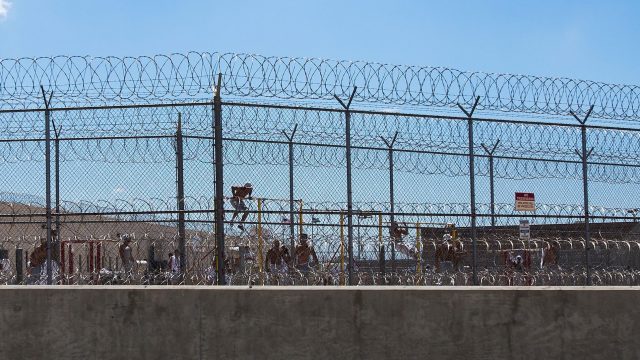Last year officials at the Stewart immigration detention center put Shoaib Ahmed, a 24-year-old immigrant from Bangladesh, in solitary confinement. The reason? He encouraged other detainees to stop working.
Ahmed was only paid 50 cents per hour to work in the facility, and he was upset that his $20 paycheck had been delayed. But when he stood up for himself he was put in solitary confinement as punishment for ten days, where he had no access to other workers, only an hour of out of cell time per day, and showers only three times per week.
The Stewart detention center is operated by the United States’ largest prison corporation, CoreCivic, under a contract with Immigration and Customs Enforcement. Last year CoreCivic made a whopping $178 million.
In an op-ed for The Guardian, Ahmed’s laywer, Azadeh Shahshahani, explains that his case is just one of many:
In April, we filed a lawsuit on behalf of Shoaib Ahmed and others against CoreCivic, alleging that the prison corporation violates human trafficking laws and employs a deprivation scheme to force immigrants detained at Stewart to work for sub-minimum wages, and then threatens to punish them for refusing to work through solitary confinement or loss of access to necessities.
A lawsuit against Geo Group, another prison corporation, is moving forward for using similar practices at the Aurora Detention Center in Colorado, violating the Trafficking Victims Protection Act.
Stewart relies on the labor of detained immigrants to keep the cooking and cleaning and other basic operations going. How convenient and profitable for the largest and wealthiest prison corporation to exploit detained immigrant labor rather than hire regularly waged employees.
Some officials and politicians depict the labor program in these detention centers as “voluntary” so that it is seen as legal under the 13th amendment of the US constitution. Yet as seen in Ahmed’s case, there are punishments are those who do not “volunteer” to work.
In fact, 18 Republican lawmakers sent a letter to Attorney General Jeff Sessions, ICE, and the Department of Labor asking them to help the private prison company Geo Group defend itself against the forced labor lawsuits. They wrote that the labor program “reduces the negative impact of confinement through decreased idleness, improved morale, and [leads to] fewer disciplinary incidents.”
This political backing should not be surprising, however, as CoreCivic gave $295,642 in federal political contributions during the 2016 election cycle — 96% of which went to Republicans, including those who signed the letter defending the private prison labor scheme.
Shahshahani argues this must come to an end. “Prison corporations that have for years enriched themselves by exploiting detained immigrant labor should be held accountable. So should the politicians who support this inhumane and illegal scheme,” she writes.







Freedom United is interested in hearing from our community and welcomes relevant, informed comments, advice, and insights that advance the conversation around our campaigns and advocacy. We value inclusivity and respect within our community. To be approved, your comments should be civil.